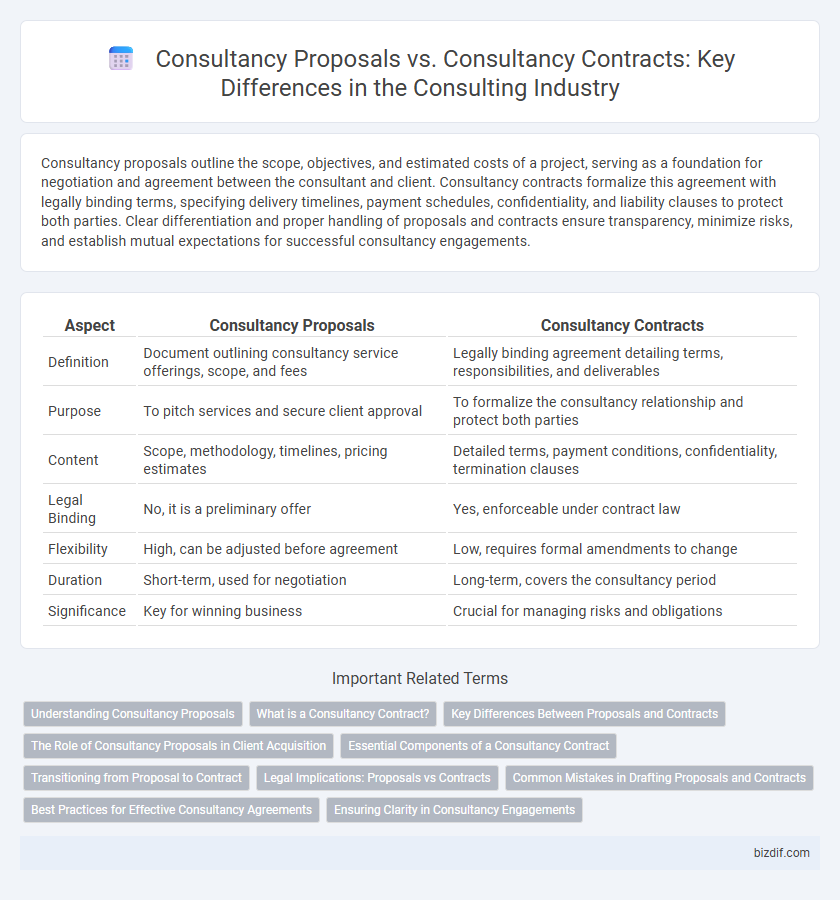Consultancy proposals outline the scope, objectives, and estimated costs of a project, serving as a foundation for negotiation and agreement between the consultant and client. Consultancy contracts formalize this agreement with legally binding terms, specifying delivery timelines, payment schedules, confidentiality, and liability clauses to protect both parties. Clear differentiation and proper handling of proposals and contracts ensure transparency, minimize risks, and establish mutual expectations for successful consultancy engagements.
Table of Comparison
| Aspect | Consultancy Proposals | Consultancy Contracts |
|---|---|---|
| Definition | Document outlining consultancy service offerings, scope, and fees | Legally binding agreement detailing terms, responsibilities, and deliverables |
| Purpose | To pitch services and secure client approval | To formalize the consultancy relationship and protect both parties |
| Content | Scope, methodology, timelines, pricing estimates | Detailed terms, payment conditions, confidentiality, termination clauses |
| Legal Binding | No, it is a preliminary offer | Yes, enforceable under contract law |
| Flexibility | High, can be adjusted before agreement | Low, requires formal amendments to change |
| Duration | Short-term, used for negotiation | Long-term, covers the consultancy period |
| Significance | Key for winning business | Crucial for managing risks and obligations |
Understanding Consultancy Proposals
Consultancy proposals serve as detailed documents that outline the scope, objectives, methodology, and estimated costs of a consultancy project, helping clients assess the consultant's approach and feasibility. These proposals are critical for setting clear expectations, defining deliverables, and establishing a foundation for negotiation before formalizing a consultancy contract. Understanding the structure and content of consultancy proposals ensures effective communication and alignment between consultants and clients, facilitating successful project outcomes.
What is a Consultancy Contract?
A consultancy contract is a legally binding agreement between a consultant and a client that outlines the terms, scope, deliverables, timelines, and payment structure for a consultancy project. It formalizes the responsibilities and expectations of both parties, ensuring clarity and protection throughout the engagement. Clear consultancy contracts reduce risks of disputes by specifying confidentiality, intellectual property rights, and termination conditions.
Key Differences Between Proposals and Contracts
Consultancy proposals outline the scope, objectives, deliverables, and estimated costs to secure client approval, serving as a preliminary agreement before project initiation. Consultancy contracts legally bind both parties by detailing specific terms, timelines, payment schedules, confidentiality clauses, and dispute resolution mechanisms. The key differences lie in the proposal's role as an offer and negotiation tool, while the contract functions as an enforceable agreement that governs the consultancy relationship.
The Role of Consultancy Proposals in Client Acquisition
Consultancy proposals play a crucial role in client acquisition by clearly outlining the scope, objectives, and value of the services offered, effectively demonstrating the consultant's expertise and solutions tailored to the client's needs. These proposals serve as a strategic communication tool that differentiates consultants from competitors and fosters trust before formal agreements are established. Well-crafted consultancy proposals increase the likelihood of securing contracts by aligning client expectations with consultant capabilities, setting the foundation for successful partnerships.
Essential Components of a Consultancy Contract
Consultancy contracts must clearly define the scope of work, deliverables, timelines, payment terms, and confidentiality clauses to ensure mutual understanding and legal protection. Essential components include dispute resolution mechanisms, intellectual property rights, and termination conditions to manage risks effectively. These elements differentiate contracts from proposals by formalizing commitments and obligations between the consultant and client.
Transitioning from Proposal to Contract
Transitioning from consultancy proposals to contracts requires clear alignment of project scope, deliverables, and timelines to ensure mutual understanding and commitment. Detailed proposals serve as the foundation for contracts by outlining service objectives, fees, and roles, which must be precisely translated into legally binding terms. Establishing communication protocols and risk management strategies during this transition minimizes ambiguities and facilitates smoother project execution.
Legal Implications: Proposals vs Contracts
Consultancy proposals outline the scope, objectives, and preliminary terms but lack legal enforceability, serving primarily as negotiation tools. Consultancy contracts formalize commitments with legally binding terms, specifying responsibilities, deliverables, payment schedules, confidentiality, and dispute resolution mechanisms. Understanding the legal implications is crucial to prevent misunderstandings and protect both parties' interests during project execution.
Common Mistakes in Drafting Proposals and Contracts
Common mistakes in drafting consultancy proposals and contracts include vague scope definitions, unclear deliverables, and ambiguous payment terms, which lead to misunderstandings and disputes. Failure to specify intellectual property rights and confidentiality obligations often results in legal complications. Overlooking dispute resolution mechanisms and termination clauses increases risk, highlighting the importance of precise and comprehensive documentation in consultancy agreements.
Best Practices for Effective Consultancy Agreements
Consultancy proposals outline project scope, deliverables, timelines, and fees, serving as the foundation for consultancy contracts that legally bind both parties. Best practices for effective consultancy agreements include clear definitions of roles and responsibilities, detailed payment terms, confidentiality clauses, and dispute resolution mechanisms. Ensuring mutual understanding and incorporating performance metrics enhance accountability and successful project execution.
Ensuring Clarity in Consultancy Engagements
Consultancy proposals outline the scope, objectives, and deliverables of a project, serving as a foundation for mutual understanding between the consultant and client. Consultancy contracts formalize this agreement with detailed terms, responsibilities, timelines, and payment conditions to prevent misunderstandings and disputes. Ensuring clarity in both documents is critical for effective consultancy engagements, fostering transparent communication and aligned expectations.
Consultancy Proposals vs Consultancy Contracts Infographic

 bizdif.com
bizdif.com